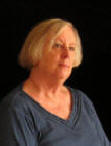Questions?
Call us toll free:
1-800-856-3060

Richer Resources: Hi Sally. Thank you for agreeing to an interview.
Sally Zakariya:
Thanks for giving me a chance to talk about poetry.
Richer Resources: How long have you been writing?
Sally Zakariya:
I’ve been writing as long as I could hold a pencil. My first story,
which my mother saved for years, was a first-grade saga called “The Woof
King’s Revenge.” That’s “wolf” in 6-year-old spelling.
Richer Resources: When did you know poetry was one of your
niches?
Sally Zakariya: I guess I’ve always found poetry a comfortable niche. Even my short stories are so short they could probably be edited down to prose poems. Or even anecdotes.
Recently, I heard an interview with a dyslexic poet, who said he finds writing difficult and chose poetry because he wants to tell stories succinctly. That same urge for brevity makes sense to me, though I came to it by spending four decades editing magazines and books. The first task of the editor is to cut away the excess verbiage and shape the message with spare, strong language.
Richer Resources: Was there a poet or poem which particularly spoke to you early on and impelled you in this direction?
Sally Zakariya: My mother, who was also a writer, used to recite “The Highwayman,” by Alfred Noyes, to my sister and me when we were little. I can still remember those first lines: “The wind was a torrent of darkness among the gusty trees, / The moon was a ghostly galleon tossed upon cloudy seas …” That poem was my first inkling that words have power – the power to tell a story, to paint a picture, to make music, to make you think.
Then, in high school, when young men I knew were going off to Vietnam, I was haunted by Randall Jarrell’s “The Death of the Ball Turret Gunner,” with its stunning last line, “When I died they washed me out of the turret with a hose.” Those words still stop me in my tracks.
Richer Resources: Poetry has been around for a long time. What do you feel is the secret to its lasting appeal?
Sally Zakariya:
The urge to communicate, to connect, goes back long before written
language – I’d bet that the early humans who left pictures in the caves
in Lascaux sang of their deeds and their dreams around the fire.
Poetry’s appeal lies as much in its sound as its meaning, as much in
what it evokes as what it says. But the real power of poetry is its
universality – all cultures have some sort of poetry, from the classical
Greek odes to today’s rap music. And the wonder is, anyone can write a
poem. Try it.
Richer Resources: Thank you for your interview and
congratulations on the publication of your book.
At Richer Resources, we are dedicated to the creation of high quality books, art and other media intended to enrich the lives of individuals of all ages.
As an independent publisher, we are bound by a sense of integrity and quality to produce products which enhance the lives and vision of individuals everywhere.
Sign up to receive notice of free eBooks, new releases and special subscriber-only offers.
(You can unsubscribe at any time)